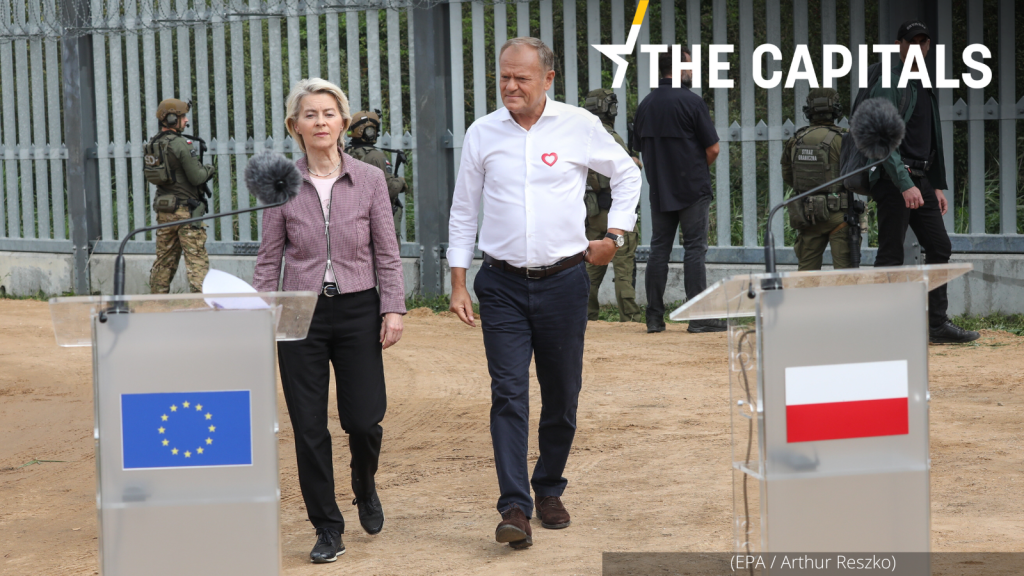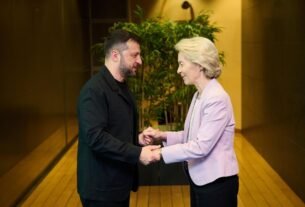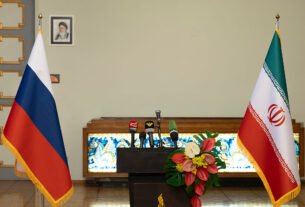Good Monday morning and welcome back to The Capitals – get ready for one hell of a rentrée.
Europe faces major changes in the weeks ahead. So does this newsletter. I’m Eddy Wax, here with Nicoletta Ionta and the rest of Euractiv’s newsroom.
Got a tip, rumour, or story idea? Drop me a line by email – or, for the more discreet, via Signal: @EddyWax.94
Today’s edition is powered by European Hydrogen Week
Shaping a competitive net-zero future at the European Hydrogen Week!
The EU Hydrogen Week 2025 is the place to be for discussions on a net-zero future and the legislation needed to support the hydrogen economy. Join us in Brussels and be part of the latest in climate policy, technology and market trends for hydrogen!
In the capital
Gun-toting Belarusian soldiers moved within earshot of Ursula von der Leyen on Sunday as she addressed reporters with Donald Tusk on the Poland-Belarus border. The troops advanced to the steel fence Warsaw built to block intruders and the migrants it accuses dictator Aleksandr Lukashenko of sending across.
Forces loyal to Minsk – a key cog in Vladimir Putin’s war machine – glaring at the EU’s chief and Poland’s PM became the image that neatly capped a weekend of diplomacy. In Copenhagen, foreign ministers huddled over how to strengthen Ukraine for the war’s elusive endgame but struggled to make progress.
They failed to agree on using the €17 billion Peace Facility to pay for American weapons to pass on to Ukraine under a new NATO scheme, which Donald Trump has welcomed. EU foreign policy chief Kaja Kallas blamed the blockage on Hungary, according to Euractiv’s Aurélie Pugnet, who has all the details in our new defence newsletter FIREPOWER, shooting into your inboxes three times a week from today.
As my colleague Alexandra Brzozowski reported from Denmark, the thorny question of handing Ukraine billions in frozen Russian assets also went unresolved, with countries still at odds on how to do it without battering the reputation of the euro or plunging into a legal quagmire. Just €3.7 billion in windfall profits has reached Kyiv, far below what will be needed to rebuild the country.
American-backed security guarantees also remain opaque. Who is committing what? European countries with sizeable armies like Poland and Germany – France and Britain excepted – are hesitant, wary of the political ramifications of committing troops to deter Russia.
Von der Leyen told the FT that member states have a “clear road map” of deployments and “pretty precise plans” – without giving precise details. “This work is going forward very well,” she claimed. Not everyone is convinced: on ZDF, Germany’s Friedrich Merz said on Sunday that “nobody is talking about ground troops in Ukraine at this point.”
Leaders will revisit the issue at Emmanuel Macron’s Élysée Palace on Thursday, the paper reported.
Unity, meanwhile, frays. Slovak PM Robert Fico will again meet Putin, this time in China on Wednesday, his third such encounter in less than a year.
As Volodymyr Zelenskyy hammers Putin for refusing to meet, momentum toward a ceasefire – briefly stirred by recent summits in Alaska and Washington – appears to be fading. Merz summed up the mood bluntly: I am preparing, he said, for the war to “last a long time.”
Von der Leyen has at least toughened her words, branding Putin a “predator.” She called him that in Latvia, Finland, Poland, Estonia and Bulgaria, where she visited arms factories and sold her long-term budget proposal as a defensive boost for frontline states.
The language, however, was borrowed. Macron labelled Putin a “predator” and an “ogre” last month, sparking outrage from Moscow.
She wraps up her tour in Lithuania and Romania today.
Bayrou’s tiny window
French PM François Bayrou gave a televised interview last night, in what my colleague Laurent Geslin describes in his write-up as a swan song ahead of a confidence vote he is likely to lose on 8 September.
Bayrou, who initiated the vote himself, offered concessions on his unpopular budget cuts to both the left and right, pledging higher taxes on the wealthy and a reappraisal of France’s EU contributions. He also said his plan to scrap two public holidays was “entirely negotiable.”
Accusing unnamed opponents of “willing chaos,” Bayrou appealed for public support and said there was still a “tiny window of opportunity.” His days in office appear numbered, but at times his cadence was less that of a cornered politician and more that of a candidate rehearsing for higher office… the presidency perhaps.
EU-US trade deal wobbles
The EU-US trade deal was thrown into disarray on Friday after a US federal appeals court ruled that many of Trump’s sweeping tariffs on trading partners – including the EU – are illegal, Thomas Møller-Nielsen reports.
The ruling, which upheld a May decision by the US Court of International Trade, means that the legality of Trump’s “reciprocal tariffs” – including a 15% duty on most EU exports – might ultimately be determined by the country’s Supreme Court. For now, the levies remain in place until 14 October, giving the administration time to appeal. The decision does not affect Trump’s levies on steel, aluminium, copper, or cars, which were imposed under a different legal framework.
The European Commission, which declined to comment on the court’s decision, has urged Washington to deliver on its pledge to slash its duties on EU cars from 27.5% to 15% under last month’s “framework agreement” – not legally binding.
Meanwhile, as Brussels hunts for other trading allies, The Capitals hears EU commissioners will take up the controversial Mercosur trade deal at a meeting on Wednesday.
The capitals
PARIS
Jean-Noël Barrot, France’s Europe minister, visited Greenland’s capital yesterday to demonstrate support for the territory as Danish officials confront U.S. influence campaigns linked to Donald Trump – who has threatened to take over the island. The visits come after revelations of American operatives compiling lists of pro- and anti-Trump Greenlanders, raising tensions over Washington’s growing interest in the Arctic territory.
ROME
PM Giorgia Meloni’s office hit back at Bayrou’s accusation of “fiscal dumping,” calling it “totally unfounded” and stressing that Italy has doubled its flat-tax burden since 2016 rather than fired firms with unjustified incentives. In a sharp statement, Palazzo Chigi said it has long suffered from “European tax havens” and urged France to join its push in Brussels against member states engaged in systemic tax dumping.
BERLIN
Germany will start helping municipalities pay off old debts beginning in 2026, Merz pledged at his Christian Democrats’ party conference in North Rhine-Westphalia, which votes in local elections 14 September. He also called for welfare reforms and spending restraints, warning that the country has been “living beyond our means.” The far-right AfD, now leading in some polls, is expected to make gains.
WARSAW
This capital – along with that of Finland, Latvia, Lithuania and Estonia – has asked the Commission for fresh funding to bolster border security, citing hybrid threats from Belarus and Russia. In a letter, the interior ministers pressed for stronger aerial surveillance and counter-drone technology after explosive drones crossed into their territories, including one that crashed in Poland last week.
VIENNA
Russia has threatened retaliation if Austria moves toward NATO membership, with Dmitry Medvedev, a close confidant of Putin, warning Vienna would face the same measures as Sweden and Finland. In an op-ed, Medvedev accused Austria of abandoning neutrality protected by the 1955 State Treaty and proposed moving international organisations out of this capital. Foreign Minister Beate Meinl-Reisinger retorted that only Austrians get to decide their own security – not Russia.
MADRID
Spain has declared the wildfire crisis is over, with Civil Protection chief Virginia Barcones on Sunday announcing an end to the blazes that scorched more than 400,000 hectares, left eight dead, and forced thousands to flee their homes in recent weeks.
Also on Euractiv
Brussels is in the grip of a drug war, with nearly 60 shootings this year, but Alain Hutchinson, the city’s commissioner for Europe, insists expats should not be alarmed. In an interview with Euractiv, he said the violence is confined to “rotten” districts like Molenbeek and Anderlecht – even as prosecutors warn of an “alarming trend” shaking Europe’s de facto capital.
From Meta to OpenAI, the world’s leading AI developers are feeding their chatbots users’ private conversations, often without clear consent. Europe’s regulators have so far failed to rein in the practice, even as it raises profound questions about privacy and the intimate role AI plays in daily life.
Agenda
- Roberta Metsola hosts a breakfast meeting with EU 27 national ambassadors to discuss simplification, the MFF, and institutional reforms
- Informal meeting of ministers for European affairs takes place Copenhagen
- Ursula von der Leyen travels to Lithuania and Romania: meets Lithuania President Gitanas Nausėda, visits the Lithuania-Belarus border, then meets Romanian President Nicușor Dan and PM Ilie Bolojan
- António Costa attends the Bled conference in Slovenia alongside commissioners Kaja Kallas and Hadja Lahbib
Contributors: Alexandra Brzozowski, Thomas Møller-Nielsen, Laurent Geslin, Elisa Braun, Magnus Lund Nielsen, Chris Powers, Angelo di Mambro, Natália Silenská, Inés Fernández-Pontes, Aleksandra Krzysztoszek, Vince Chadwick
Editors: Christina Zhao, Sofia Mandilara






